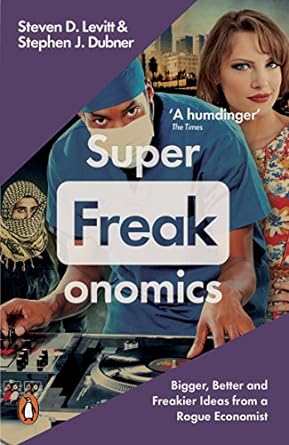Superfreakonomics
Global Cooling, Patriotic Prostitutes, and Why Suicide Bombers Should Buy Life Insurance, By Steven D. Levitt and Stephen J. Dubner
Summary

| Content | 8/10 |
| Readability | 8/10 |
| Presentation | 7/10 |
| Ideas | 8/10 |
| Value for money | 8/10 |
| Did it do what it said on the box? | 8/10 |
How do the rankings work?
The Review
Fascinating, fun, and more depth than the first book
This book is a worthy, and in my view a better, successor to the original "Freakonomics". I found the original book fascinating, but ultimately frustrating because after good beginnings it lost its way and felt light on content. The second book avoids that problem, keeping the thought provoking analysis and insights coming all the way.
The new book has a very broad scope – trying to understand the economics and human psychology which drive aspects of human existence as disparate as female oppression and prostitution, terrorism, effective medical treatment, altruism, vehicle safety, and global problems such as climate change.
As before, Levitt and Dubner spend a lot of time challenging received wisdom, citing detailed research and comprehensive data which prove that in many cases our common understanding of how things work "just ain’t so". Typically the underlying research is not their own, but they have done a wonderful job of bringing together a larger number of different findings into a set of readily readable chapters, each of which have a strong unifying theme in the form of a key question. My favourite: "What Do Al Gore and Mount Pinatubo Have In Common?"
Towards the end of the book, they also make an interesting proposition, that a large number of human problems can be resolved with relatively simple solutions, if we have the will to make it happen. The adoption of seat belts is cited as a major previous success, and the idea is then developed to explore several possible relatively low-cost geo-engineering solutions to global warming. Views may differ on how humanity must balance behavioural and technical solutions to its current challenges, but their argument is a strong one, based on a frank and realistic assessment of typical behaviour.
As a counterpoint, the final chapter recounts an experiment which proved that much of human economic behaviour can be replicated in other animals. I just loved the story of the monkeys who were introduced to the concept of money, and promptly invented prostitution!
Despite the range and depth of the subject matter, the book is always readable, with frequent "laugh out loud" moments. Anyone can pick up this book, enjoy it and take away an improved understanding of the underlying drivers for human (and monkey) behaviour. I freely recommend it to anybody interested in doing so.
Buy It From Amazon
Amazon.co.uk  |  | Amazon.com
|

 Thoughts on the World (Main Feed)
Thoughts on the World (Main Feed) Main feed (direct XML)
Main feed (direct XML)